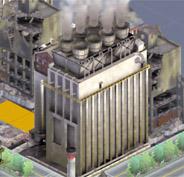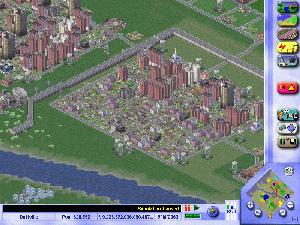“The More Things Don’t Change, The More They Stay The Same”
In the world of computer gaming there are only a few minimum criteria that
a person must have in order to be considered a real gamer. One of those basic
criteria is that you know what Sim City, and Sim City 2000 are,
and that you have hopefully played them.
There
are several defining games in the world of PC gaming, titles that created entire
genres of future games. When Sim City hit the streets in 1988, it broke
all the molds. It was the first simulation of running and building a city. There
was no victory, no fighting, just the attempt to create the perfect city populated
by SIMS, as the little virtual people were called. Then in 1992 came Sim
City 2000 which took the Sim City formula, expanded on it, and damned
near perfected it into one of the best, most enduring games ever made.
Even by today’s standards, Sim City 2000 is one good looking, great
playing “software toy” as those sorts of games are sometimes called. It has
been 6 years since Sim City 2000. Six years of playing Maxis’ (the creators
of Sim City) other, lower quality Sim Games (achem, Sim Copter, ahem).
With the possible exceptions of Sim Ant and Sim Earth, Sim
City and Sim City 2000 were far and away the best that Maxis ever
made.
But now, we have Sim City 3000. After the incredible leap that Sim
City 2000 was over the original, it isn’t unreasonable to think that we
were all expecting something big of Sim City 3000. Real big. What we
got instead is Sim City 2000 version 2.
The basic premise of Sim City 3000 is to… well… build and manage
a city. You have to deal with zoning, utilities, budget, water, power, land
values, tourism, crime, disasters, pollution, and just about everything else
under the sun. All the while trying to make a metropolis pretty enough to make
Paris blush.
To make a city you must set up industrial, commercial, and residential zones
with varying levels of density. Then you must supply transportation, power,
and water. You have to make the city a good place for people to come to. If
you accomplish this, SIMS, the virtual people in the game, will flock to your
city to build houses, business, factories, airports, etc… Tax revenues must
be collected, money must be carefully spent. Every little factor that you could
imagine can cause SIMS to be happy or sad. They can cause your city to either
be a shinning citadel, or a run-down slum. This sort of depth makes Sim City
3000 a rewarding, entertaining game. But, although SC3000 has gotten
slightly more complicated, it is still essentially the same as SC2000.
 The
The
graphics have received a major overhaul from SC2000. The world is still based
on a grid, seen at a 45º angle from variable zoom levels. The buildings
are highly detailed; everything is colorful and fun to look at when things are
going well, depressing when things are going badly. In a major improvement,
you can actually see your little SIMS walking around, and driving their cars
down the streets. Traffic jams are now actually viewed in full detail (A truck
is in the middle of an intersection, can’t back up, etc…) rather than just a
few dots.
Although most of the time the graphics are very detailed and compelling, for
some reason, at the closest zoom level, all the buildings get blurred and pixilated,
like the designers neglected to render one layer of magnification in a rush
to finish the game. There are a few other features, like the Building Architect
Tool, only available online, that also point to SC3000 being rushed out
the door before completion. The terrain is also rather abstract and insubstantial,
unlike the fairly convincing terrain of SC2000.
Sound is also well done. The audio does a good job of portraying the hustle and bustle of a city to the gamer. The soft jazz soundtrack also makes for a comfortable, pleasant gaming experience.
Very little is new, though, about SC3000. There is the addition of
famous landmarks like the Empire State Building, which you can pop into your
city to attract tourists. There is a new interface which is a complete break
from the highly modular, window based interface of SC2000, but works well enough
and may be sipler for less serious computer users.
There are also just a hell of a lot more types of everything, from houses to
industrial plants. The variety in the types of buildings has been greatly increased.
This makes your cities more unique and neighborhoods far less redundant. There
are also a few streamlining fixes, water pipes and subways no longer interfere
with each other, and the behind the scenes AI that controls the little factors
in the game is more complex now, making SC3000 even deeper and more complex.
Contrary to the belief of many politicians, money will no longer solve everything.
In addition, the role of the “neighboring cities” has been expaned, you can
now trade with them, or try to cheat their shirts off.
Overall, however, there is simply not very much new here. Sim City 3000
adheres rigidly to the Sim City 2000 formula, updates the graphics, and
adds in a few new touches. Think of is as Version 2, the 1999 update. That is
not to say that it does not play very well. In fact, it is every bit as much
fun as Sim City 2000 was. We were all just expecting a little more, something
different. You know, come to think of it, Sim City was contemporary,
Sim City 2000 would get slightly futuristic, so shouldn’t Sim City
3000 really be simulating the city of 1000 years in the future? Perhaps
that’ll be Maxis’ next game. Hell, I’ll by that for a dollar.
-
Same Old Great Gameplay
-
Good Graphics & Sound
-
More Compelxity
-
Somewhat Rushed
-
Very Little New Here







